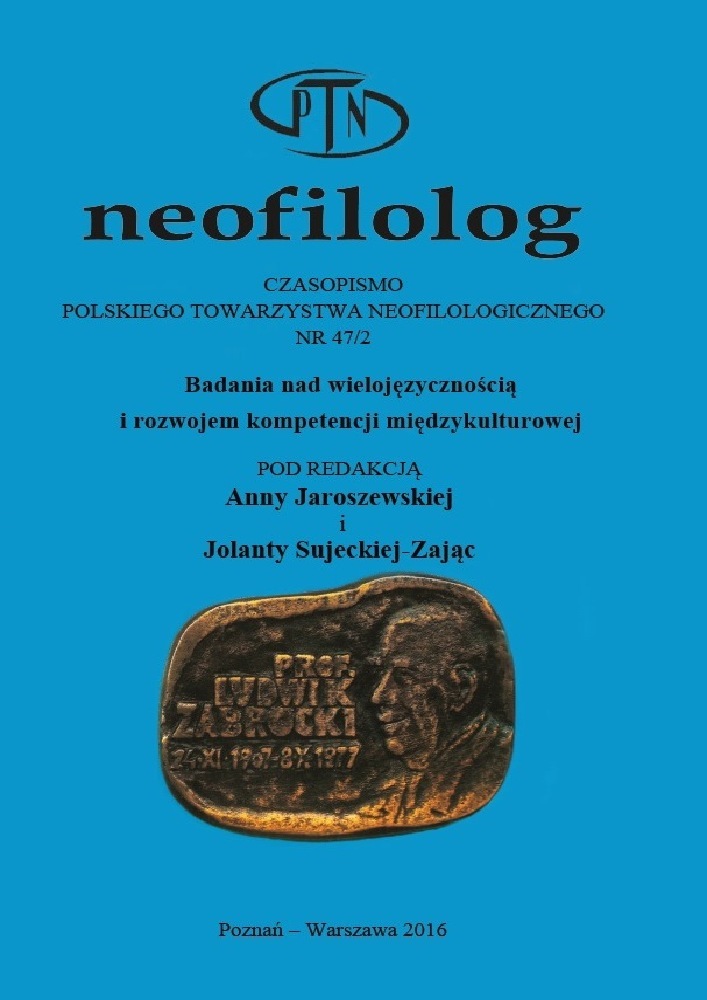Abstrakt
In this paper we propose to study, through the results of the reflexive activity of verbalization, cognitive and metacognitive strategies that advanced Polish native learners in French are implementing to construct their representations of the functioning of the French grammatical aspect.
The value of the grammatical aspect, expressed in French by the opposition between the passé composé tense and imparfait tense, do not completely coincide with that of the Polish aspectual opposition between perfective and imperfective verbs. Thus, the objective of this research is to analyze the impact of implicit and explicit knowledge from the source language on the construction of the operational rules concerning the grammatical aspect in French. In particular, it will be aimed to characterize the nature of this knowledge and verify how the educational culture of Polish learners affects the processing of grammatical input of the target language.
Bibliografia
Agrell, S. 1918. Przedrostki postaciowe czasowników polskich. Materiały i Prace Komisji Językowej Akademii Umiejętności w Krakowie. Tom VIII. Kraków: Nakładem Akademii Umiejętności.
Beacco, J.-C. 2010. La didactique de la grammaire dans l’enseignement du français et des langues. Paris: Didier.
Beacco, J.-C. 2008. « Les cultures éducatives et le Cadre européen commun de référence pour les langues ». Revue japonaise de didactique du français 3. 6-18.
Desclés, J.-P. 1980. « Construction formelle de la catégorie grammaticale de l’aspect (essai) », w: David, J. i Martin R. (red.). Colloque de Metz sur l’aspect. Notion d’aspect. Paris: Klincksieck. 178-237.
Guentchéva, Z. 1990. Temps et aspects : L’exemple du bulgare contemporain. Paris : Éditions du CNRS.
Mondada, L. i Pekarek Doehler, S. 2000. « Interaction sociale et cognition située : quels modèles pour la recherche sur l’acquisition des langues ? ». Acquisition et Interaction en Langue Étrangère 12. 147-174.
O’Malley M. i Chamot A. 1990. Learning strategies in second language acquisition. Cambridge : Cambridge University Press.
Starościak, K. 2013. Les valeurs du passé composé et de l’imparfait français dans la culture métalinguistique des polonophones. Pour une grammaire didactique contextualisée. Thèse pour l’obtention du doctorat en Didactique des langues : Université Paris 3- Sorbonne Nouvelle.
Tardif, J. 1992. Pour un enseignement stratégique : l’apport de la psychologie cognitive. Montréal : Logiques.
Vasseur, M.-T i Arditty, J. 1996. « Les activités réflexives en situation de communication exolingue : réflexions sur quinze ans de recherche ». Acquisition et Interaction en Langue Étrangère. 8. 57-87.
Licencja
Prawa autorskie (c) 2018 Katarzyna Starościak

Utwór dostępny jest na licencji Creative Commons Uznanie autorstwa – Bez utworów zależnych 4.0 Międzynarodowe.
Przedstawiany utwór (artykuł) upubliczniany jest na podstawie umowy z autorem i na licencji Creative Commons Attribution-NoDerivatives 4.0 International (CC BY-ND 4.0).
Użytkownicy mają obowiązek podania wraz z rozpowszechnionym utworem, informacji o autorstwie, tytule, źródle (odnośniki do oryginalnego utworu, DOI) oraz samej licencji;
- bez tworzenia utworów zależnych,
- utwór musi być zachowany w oryginalnej postaci.
Uniwersytet im. Adama Mickiewicza w Poznaniu zachowuje prawo do czasopisma jako całości (układ, forma graficzna, tytuł, projekt okładki, logo itp.).
